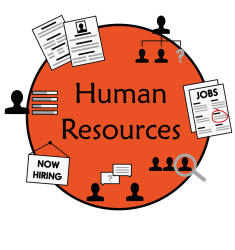Explore Human Resources
Table of contents
Benefits Administration
Business Statistics
Compensation Management
Employee Responsibilities
Employee Rights
Employment Law
Equal Employment Opportunity
Human Resource Information Systems (HRIS)
Labor Markets
Performance Management
Personnel Management
Personnel Training and Development
Recruiting
Rewards Management
Strategic Human Resource Management
HR Management Courses
The variety of courses offered through Study.com looks closely at the concepts and skills necessary for human resource management.
Explore our full library of human resources courses:
What is Human Resources?
Human resources management (HRM), frequently referred to as human resources (HR), is a company or business's department that focuses on hiring and managing employees. This department is responsible for recruiting, hiring, establishing employee standards and benefits, compliance with labor laws, employee counseling, administering compensation and benefits for employees, and more. The human resource department is frequently in charge of creating and overseeing the company's policies and how those policies affect and impact the relationship between the employees and the culture or mission of the business.
Human resources play a significant role in the development and success of a company because this department works as a link to support the individual employee in the workplace setting. Their job is to utilize policies and procedures to maximize employees' productivity and provide a safe and constructive environment. People who work in human resources are insightful employees who can calmly address conflicts and are adept in conflict resolution. Even though human resource employees work behind the scenes, they are crucial to establishing a positive workplace culture that generates success. Human resource management operates with common objectives to accomplish all of these tasks. These objectives include cultural growth, organizational support, administration of procedures, personal advancement, and organization for the goals of the company.
Learning how to balance employees and the work setting is not always easy and is usually a job that requires a bachelor's degree. Sometimes colleges have human resources degree programs, but related fields like business management or a master's degree can also open a door for this career opportunity.





Skills & Qualifications that Look Great on an HR Resume
 |
Human Resources (or People Operations or Employee Experience) serve a critical function for any business or organization. From staffing to severance packages, HR professionals organize and manage nearly all aspects of employees' relationships with their employers. The role of a human resources professional can focus on a specific task as part of a larger HR team or encompass everything from hiring and training to policy management and office administration. Keep reading to learn about the essential skills and qualifications needed to develop and continually cultivate to succeed in a human resources career.
Technical Skills & Qualifications for an HR Resume
Technical skills, also known as hard skills, require specific job training to build competencies in measurable ways. Often, certain technical skills overlap with others to ensure a well-rounded skillset. Using a computer program to manage employees or speaking a foreign language to establish an inclusive company culture are some examples of technical skills that could benefit an HR professional. Here are a few more that would stand out on a human resources resume:
Recruitment & Hiring Skills
Human resources professionals' main responsibilities primarily focus on an organization's employees, including:
- Recruiting and staffing
- Professional networking
- Background check coordination
- Salary and benefit negotiation
- Contract negotiation
- Safeguarding private data
- Interviewing and hiring
- Policy setting and training
Recruiting and staffing for a company can involve professional networking - knowing the right people and agencies that can connect a company with top candidates. However, HR professionals need to be able to balance the effectiveness of a talent source with budgetary concerns of the company.
Once potential employees are found, it can fall under the role of the human resources team to coordinate any necessary background checks, salary and benefit negotiations, contract terms, as well as safeguard appropriate personal data. HR members may also be involved in the interviewing and hiring process, including ensuring new employees have access to required company policy and training materials.
Training Skills
While a new employee's team or supervisor might provide training for job-specific tasks, Human Resources develop and present training materials for broad company-based policies and procedures, such as:
- Employee handbook or manual
- Compensation and benefits packages
- Mandatory compliance training
- Skills assessment and skill-gap training
Training involves mastering several technical and soft skills, including proficiency with certain computer software and both written and verbal communication skills.
Project Management Skills
Another technical skill that integrates expertise in multiple domains, project management in the HR realm focuses more on organizational administration than specific projects. However, the elements of project management remain the same:
- Initiating and planning team and company functions
- Scheduling and coordinating meetings and events
- Identifying and minimizing risks to the company
- Budgeting, procurement, and inventory management
- Company-wide project lifecycle management
Projects handled by the HR department can involve the entire company, making scheduling and organization somewhat complicated. HR projects consider company liability and budgetary concerns on a large scale, while also taking into account the effects on each department and team within the organization. Like any project, HR members must adhere to deadlines and generate reports.
Technology Skills
Human resources professionals use data entry skills and their knowledge of standard office production software and specialized programs to manage personnel files and records. Human Resource Information Systems (HRIS) and Human Resource Management Systems (HRMS) secure and organize company and employee information, including compensation and payroll processing, performance reviews and employee feedback, benefits packages, workforce management, time tracking, documentation and reports, and tax information.
Having experience with HRIS and HRMS platforms is vital to an HR professional. Companies use these systems to ensure their processes are compliant with current regulations and their employees' data is centralized and secure. This allows HR teams to stay organized and access the most up-to-date information.
There are other technology skills and expertise that can help an HR professional's resume stand out:
- Website development - HTML, CSS, JavaScript, PHP, Perl, .NET
- Automation tools - Python, SQL, VBScript, Java
- Social media - marketing, recruiting, company branding
- Office suites - Microsoft 365, Google Workspace, iWork, WPS Office
- Graphic design - photo/image manipulation, logo design, video production
- Artificial intelligence - ChatGPT, AutoGPT, DALL.E 2, machine learning
Soft Skills for an HR Resume
Soft skills, or people skills, are critical to those in human resources, since much of their work is coordinating and interacting with the people within and outside an organization. While soft skills can be learned, mastery of some may come more easily to people based on their personality type. For example, extroverted people might be more comfortable with public speaking while those who have always lived in culturally diverse places could be more proficient establishing an inclusive company culture. Some soft skills that would look exceptional on an HR resume include:
Communication
The cornerstone of interacting with people is being able to communicate, and HR professionals need to be skilled at both written and verbal communication. Whether drafting a company policy or giving a presentation, they need to provide clear and accurate information. On the flip side, attentive and active listening skills are just as essential and applicable to many facets of a role in human resources.
Collaboration & Teamwork
Everyone within an organization - from the CEO to the newest hire - engages with the HR team, making it important for them to all ensure they're aligned and working together toward the same goal.
Decision Making & Critical Thinking
The human resources team are often the decision makers regarding employee issues within an organization. The ability to assess a situation and apply critical thinking to identify solutions helps them make the correct decisions. Mastering this soft skill also shows leadership characteristics.
Problem Solving & Conflict Resolution
Working with people almost ensures there will be problems and conflict, and it's the job of human resources to maintain a cooperative workplace, resolve disagreements, and strive for employee satisfaction while prioritizing company values and goals. To do this, HR specialists need to be proficient at policy enforcement and de-escalation in the workplace in a respectful yet firm manner.
Administration & Operations
HR does much to keep an organization running smoothly. Managing compensation and benefits for a company requires regulation and legislative monitoring to ensure the company is legally compliant. They're also responsible for establishing a safe, inclusive, and culturally sensitive workplace.